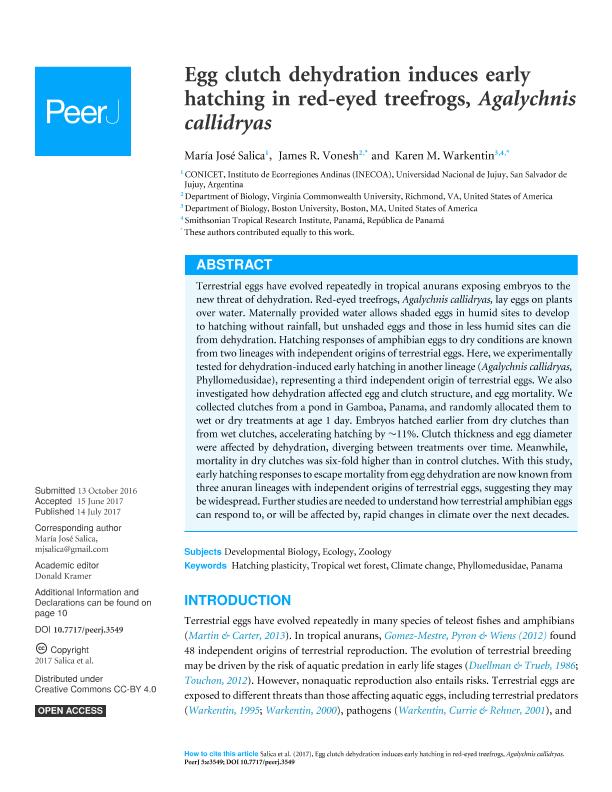Mostrar el registro sencillo del ítem
dc.contributor.author
Salica, María José

dc.contributor.author
Vonesh, James R.
dc.contributor.author
Warkentin, Karen M.
dc.date.available
2018-05-21T19:36:46Z
dc.date.issued
2017-07
dc.identifier.citation
Salica, María José; Vonesh, James R.; Warkentin, Karen M.; Egg clutch dehydration induces early hatching in red-eyed treefrogs, Agalychnis callidryas; PeerJ; PeerJ; 5; 7-2017; 1-13; e3549
dc.identifier.issn
2376-5992
dc.identifier.uri
http://hdl.handle.net/11336/45794
dc.description.abstract
Terrestrial eggs have evolved repeatedly in tropical anurans exposing embryos to the new threat of dehydration. Red-eyed treefrogs, Agalychnis callidryas, lay eggs on plants over water. Maternally provided water allows shaded eggs in humid sites to develop to hatching without rainfall, but unshaded eggs and those in less humid sites can die from dehydration. Hatching responses of amphibian eggs to dry conditions are known from two lineages with independent origins of terrestrial eggs. Here, we experimentally tested for dehydration-induced early hatching in another lineage (Agalychnis callidryas, Phyllomedusidae), representing a third independent origin of terrestrial eggs. We also investigated how dehydration affected egg and clutch structure, and egg mortality. We collected clutches from a pond in Gamboa, Panama, and randomly allocated them to wet or dry treatments at age 1 day. Embryos hatched earlier from dry clutches than from wet clutches, accelerating hatching by ∼11%. Clutch thickness and egg diameter were affected by dehydration, diverging between treatments over time. Meanwhile, mortality in dry clutches was six-fold higher than in control clutches. With this study, early hatching responses to escape mortality from egg dehydration are now known from three anuran lineages with independent origins of terrestrial eggs, suggesting they may be widespread. Further studies are needed to understand how terrestrial amphibian eggs can respond to, or will be affected by, rapid changes in climate over the next decades.
dc.format
application/pdf
dc.language.iso
eng
dc.publisher
PeerJ
dc.rights
info:eu-repo/semantics/openAccess
dc.rights.uri
https://creativecommons.org/licenses/by-nc-sa/2.5/ar/
dc.subject
Hatching Plasticity
dc.subject
Tropical Wet Forest
dc.subject
Climate Change
dc.subject
Phyllomedusidae
dc.subject
Panama
dc.subject.classification
Otras Ciencias Biológicas

dc.subject.classification
Ciencias Biológicas

dc.subject.classification
CIENCIAS NATURALES Y EXACTAS

dc.title
Egg clutch dehydration induces early hatching in red-eyed treefrogs, Agalychnis callidryas
dc.type
info:eu-repo/semantics/article
dc.type
info:ar-repo/semantics/artículo
dc.type
info:eu-repo/semantics/publishedVersion
dc.date.updated
2018-04-24T15:15:51Z
dc.journal.number
5
dc.journal.pagination
1-13; e3549
dc.journal.pais
Estados Unidos

dc.journal.ciudad
San Diego
dc.description.fil
Fil: Salica, María José. Universidad Nacional de Jujuy. Facultad de Ciencias Agrarias. Instituto de Ecorregiones Andinas. Consejo Nacional de Investigaciones Científicas y Técnicas. Centro Científico Tecnológico CONICET - Salta. San Salvador de Jujuy; Argentina
dc.description.fil
Fil: Vonesh, James R.. Virginia Commonwealth University; Estados Unidos
dc.description.fil
Fil: Warkentin, Karen M.. Smithsonian Tropical Research Institute; Panamá. Boston University; Estados Unidos
dc.journal.title
PeerJ
dc.relation.alternativeid
info:eu-repo/semantics/altIdentifier/url/https://peerj.com/articles/3549
dc.relation.alternativeid
info:eu-repo/semantics/altIdentifier/doi/http://dx.doi.org/10.7717/peerj.3549
Archivos asociados
